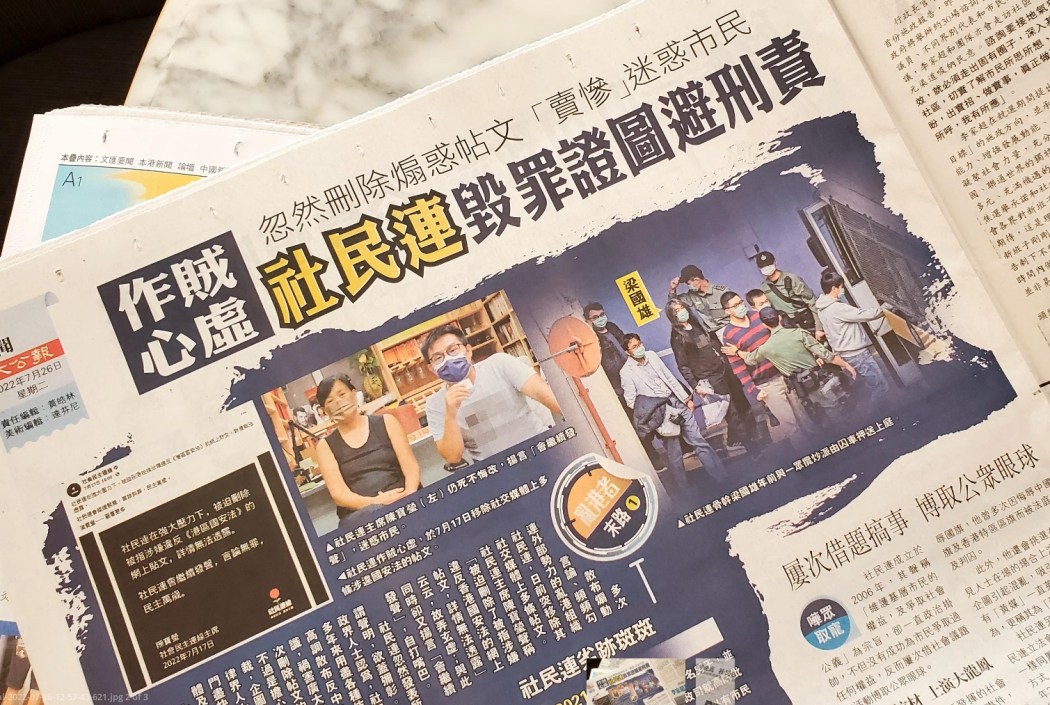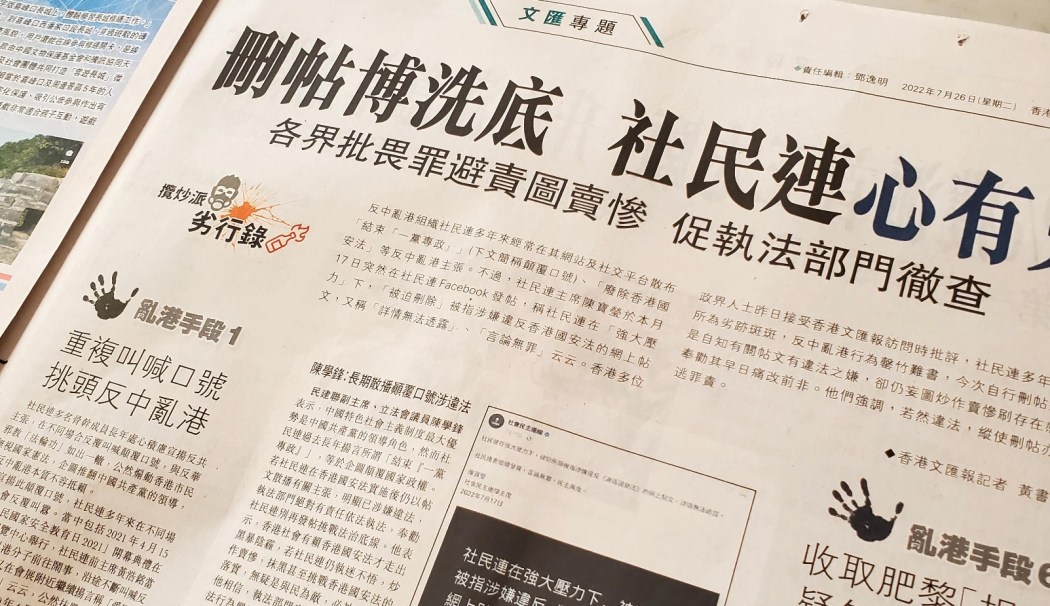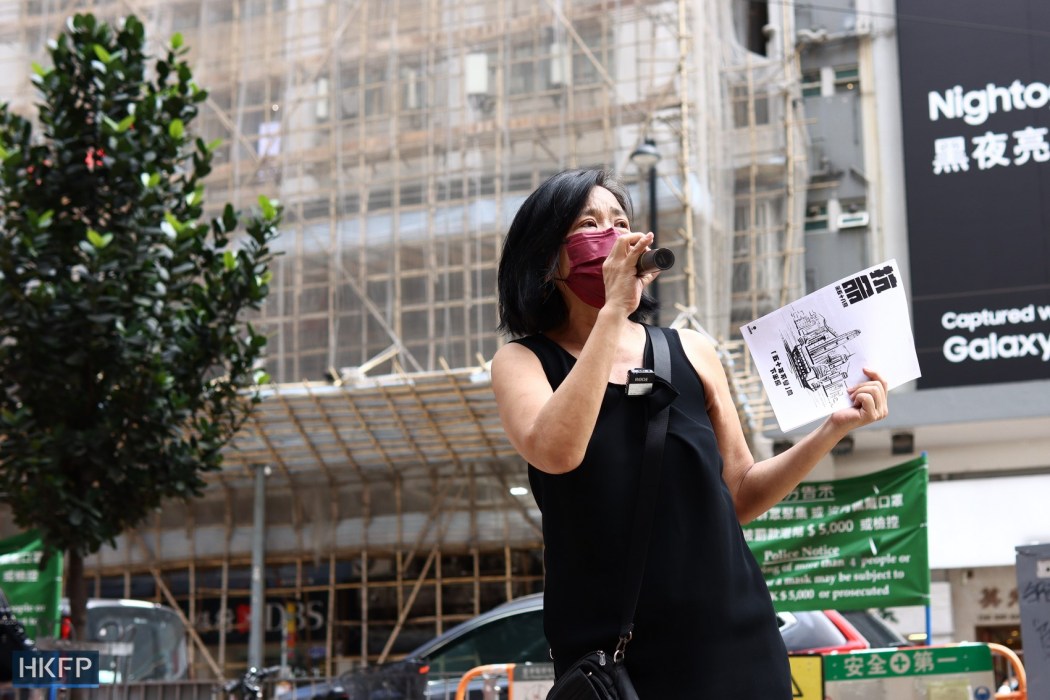Two Beijing-backed newspapers in Hong Kong have printed full-page attacks on the city’s last active protest group, saying their earlier move to delete online posts allegedly breaching the national security law showed the activists had a “guilty conscience.”

The League of Social Democrats (LSD), one of Hong Kong’s last active pro-democracy groups, came under fire on Tuesday by Chinese state-backed newspapers Ta Kung Pao and Wen Wei Po. It came around a week after the activist group said it was “forced to delete” some online posts, citing alleged violations of the Beijing-imposed security legislation.
In their full-page reports, Ta Kung Pao and Wen Wei Po both cited pro-Beijing figures as saying the deletion amounted to an attempt to “evade criminal liabilities.” Willy Fu of the Chinese Association of Hong Kong & Macao Studies told Ta Kung Pao that the LSD tried to “destroy criminal evidence” and “obstruct police investigations” by removing the online posts. He called on the local authorities to take action, saying the group may have breached the colonial-era sedition law. The group said at the time that it removed the posts “under great pressure.”

Relevant government departments “absolutely had the responsibility” to enforce the law, Wen Wei Po wrote citing Chan Hok-fung, the vice-chair of the largest pro-Beijing party DAB. The legislator urged the LSD to stop making online posts that “challenge the bottom line of the rule of law.”
“If the LSD still does not come to their senses… vilify or even challenge the implementation of the Hong Kong national security law, they are undoubtedly making the people their enemy, they will definitely be cast aside,” Wen Wei Po paraphrased Chan as saying.

State-backed media attacks are increasingly seen as warning shots from the Chinese authorities, veteran journalist and former Wen Wei Po deputy editor Ching Cheong told HKFP last May. Individuals and organisations that find themselves in the crosshairs of the publications could face ominous consequences, he said.
In Tuesday’s report, Wen Wei Po listed what they described as six disrupting Hong Kong strategies of the protest group, including repeatedly chanting slogans in an effort to “overthrow the leadership of the Chinese Communist Party,” as well as holding street booths on important dates such as the anniversary of the city’s return to Chinese rule.
The newspaper pointed to former LSD chief “Long Hair” Leung Kwok-hung, who failed to declare a donation from media tycoon Jimmy Lai when he was a lawmaker. Despite his acquittal of misconduct in 2017, Wen Wei Po said it made people question whether Leung “colluded with foreign forces.”

The publication also cited veteran activist Koo Sze-yiu’s planned demonstration against the Winter Olympic Games this February, which landed him nine months in jail for violating the sedition law. Koo is not a member of the LSD but is considered to be closely affiliated with the group.
Other “strategies” included “whitewashing rioters as martyrs” during the 2019 extradition bill unrest and staging protests in the Legislative Council, the full-page report stated. These acts were also printed in Ta Kung Pao, along with a timeline showing activism of LSD members, which they described as the group’s “stained record.”
In response to HKFP’s enquiries, LSD chairwoman Chan Po-ying described the attacks from Ta Kung Pao and Wen Wei Po as “clamping down on” the freedom of expression and “incriminating” the group based on speech and ideology.
“[The attacks] were Cultural Revolution-style denunciation and threats,” Chan said.
Earlier this month, some LSD members said their homes were searched ahead of the 25th anniversary of Hong Kong’s handover to China. Some LSD volunteers were also summoned for meetings by the national security police ahead of July 1, prompting the group to announce it would not organise any protest on the handover anniversary.
Support HKFP | Policies & Ethics | Error/typo? | Contact Us | Newsletter | Transparency & Annual Report | Apps
Help safeguard press freedom & keep HKFP free for all readers by supporting our team

latest national security stories
Support HKFP | Policies & Ethics | Error/typo? | Contact Us | Newsletter | Transparency & Annual Report | Apps
Help safeguard press freedom & keep HKFP free for all readers by supporting our team





























